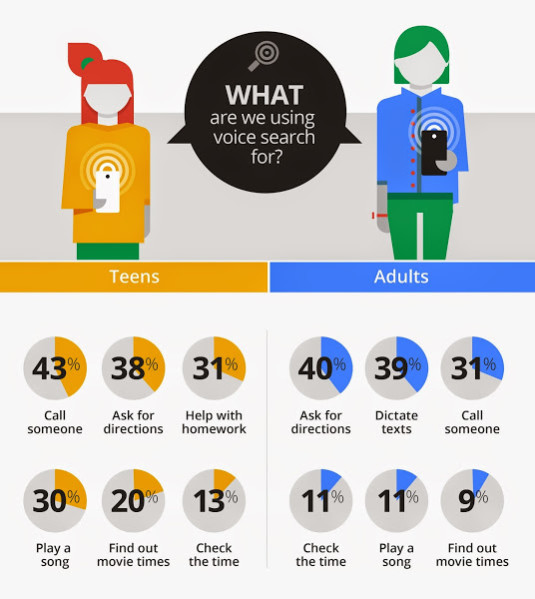Voice Search – What Is It, and What Can You Do About It?
You’re walking around in downtown Atlanta and, inspired by the Southern charm, decide you’d like to try some local soul food. Where’s the best place nearby that serves fried green tomatoes?
You’re driving (and can’t type on your phone), but you need to find a close hotel because you’re just too tired to drive much farther.
You’re planning a nice steak dinner for two, but you’re not sure which wine you should pair with a sirloin.
You’re watching Star Wars and think to yourself, “I wonder how old Harrison Ford is now.”
Using Voice Search
In each of these scenarios, you have a question, and you probably aren’t sitting at your computer. How are you going to get the answer?
If this were 1985, you might call a knowledgeable friend, drive to the library and do some research, or look in a phone book. But because it’s 2016, you’re not going to do any of those things. You’re going to use your cell phone, and you’re likely going to use voice search.
You know it as Siri, Cortana or Google Now. And if you’ve upgraded to Windows 10, voice search is ready to use on your desktop.
Google’s research shows that “more than half of teens (13-18) use voice search daily” while almost half of adults do the same.
This infographic from the Google Blog shows what we’re searching for:

Ok, so we’re using voice search to ask questions. That’s clear. What does that mean for marketers?
Google Direct Answers
When Google answers a voice search query, it tries to deliver what is known as a direct answer. You know it as the bit of information shown above the search results (10 blue links), and it’s often spoken back to you in a very Star Trek “computer” sort of way.

Here are some screenshots of direct answers from voice searches I performed on my cell phone:




In each case, I asked a question and Google provided a direct answer. I never had to click on a link.
Sounds bad if you are trying to get traffic to your site, right? So what’s a marketer to do?
Optimizing for Voice Search
There’s unfortunately no way to really measure how much traffic you get from a voice search vs. any other mobile search, however there are some things we do know.
- Voice searches are usually phrased as questions, and “Where…” questions tend to result in more conversions.
Search Engine Watch shows how some of the most common searches are phrased and what user intention is for each:

- Voice searches tend to use more words than typed searches
- Voice searches are performed by people who need information. Now.
This is where I see the biggest opportunity. In the past, some companies used a strategy of teasing users into clicking on their links by using vague meta titles and descriptions like “Find Out More About XYZ.” The user would click and read for the answer which was usually buried somewhere in the text or on page four of a slideshow. Companies wanted to encourage longer time spent on the page and pages consumed per visit.
This just doesn’t work anymore. When I know Google is going to deliver the answer, there’s no way I’m going to click on a link that is teasing me. If I do click on a link, it’s going to be the one that tells me the answer and promises more info. Here’s an example of what I mean:

All the sites above the arrow wanted me to click to find out the answer. But I found the answer in the sixth organic result. If you do this same search now, you even get a direct answer from Google sourced from CNN. So all those sites teasing me with the questions in the titles are getting very little traffic. This tactic is probably not going to work anymore.
So here’s my theory (and I’m currently testing it out). I think that if you put the answer to the user’s question in the title or at least near the top of your content without trying to hide or mask it, you’re going to get better results. You’ll probably be more likely to be used in a Google direct answer, and the user will appreciate your upfront answer, leading to that user (possibly) trusting and using your site more often.
I’ll report back and let you know how my test goes! Til then, I encourage you to be direct and honest in your online writing, and you’ll probably be more likely to get better results from mobile and voice searches.
Enjoyed this post? Read more by Laura.
Laura Lee—Account Manager



